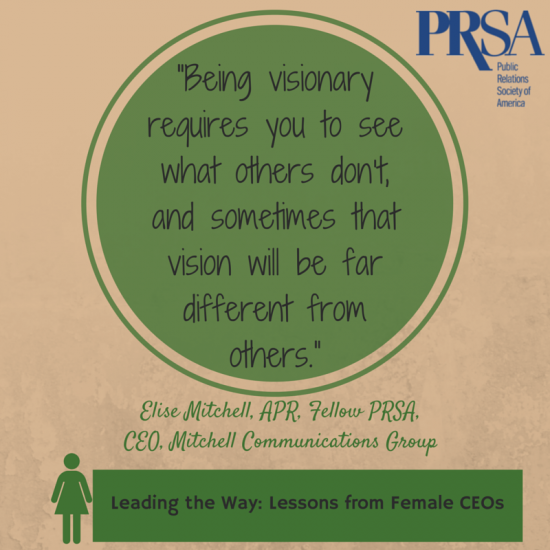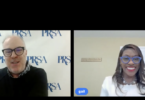Editor’s note: In recognition of the industry ideals reflected in the PRSA 2014 International Conference theme “Leading the Way: Fearless Future for PR,” we’ve invited industry-leading female CEOs to share their inspiration, tips and advice on how to grow, succeed and advance to the highest levels in the profession. Follow the “Leading the Way: Lessons from Female CEOs” series using the hashtag #PRLessonsInLeadership.
I vividly remember the night before my first day on the job in a corporate leadership role. I spent most of the evening trying to convince myself that the knot in my stomach was a result of something I ate. In reality, my nerves were getting the best of me.
I was a young professional at the time, stepping in to a new organization and up to a new level of responsibility. While my drive and ambition were in high gear, I knew there were many things I didn’t know about leadership and would have to learn quickly to perform at my best.
Not so many years after that, I began my entrepreneurial journey to build an agency from scratch and found myself facing equally daunting but distinctly different uncertainties.
Both opportunities worked out well, but I had plenty to figure out about leadership along the way. As it should be. When you are a life-long learner, you never fool yourself into thinking you know it all. But for those who aspire to leadership, you can’t help but wonder if there are certain competencies you need to master before the top spot is yours. What specific leadership skills do you need to succeed?
There are countless theories about leadership and what makes someone effective, and just as many trainings and assessment tools that can help you determine your own natural strengths and leadership style. We have a competencies framework at Mitchell Communications Group which helps us hire, develop and promote leaders. If you are not already aware of what competencies are in place for leaders at your organization, check with your HR department. Then do some honest self-assessment, not just to identify your “spikes” but, more importantly, what needs improvement.
From a more practical point of view, I have found several skills that have proven essential in my 20-year leadership journey both in the corporate world as well as at my own agency.
- Setting vision – This is the ability to create an ambitious and inspiring future for your team. Being visionary requires you to see what others don’t, and sometimes that vision will be far different from others. I like this – being different is attractive and makes you stand out as a leader. But you must be authentically you, using your values and ideas to help shape a vision that is distinctly yours. You can improve your visioning capabilities by studying emerging trends, exposing yourself to innovative thinking outside the industry, and actively participating in ideation.
- Business acumen – Effective leaders can identify and seize business opportunities to drive the business forward. Simply put, they know how to make money. Developing business acumen will help you in many ways – knowing how to accurately assess your position in the marketplace, what factors matter most for success and which strategies will help you achieve business goals. Business acumen is grounded in a solid understanding of finance. If this skill needs some work, I recommend a book called “Finance for Executives: Managing for Value Creation,” attending an executive education course on finance, or simply asking your CPA to spend a half day giving you a crash course on the basics.
- Calculated risk-taking – As rapidly as our industry is changing, you must get good at identifying where change is happening and knowing how to place smart bets. Most leaders – especially entrepreneurs – are rarely short on ideas. Our bigger challenge is knowing which ones to pursue. The trick is to balance risk and discipline to yield solid results. This begins by having a clear understanding of your value proposition, knowing where you can win, and playing to your strengths. We’ve established some unique capabilities at Mitchell through the years and most have proven profitable and differentiating, but there are many more ideas that never made it past the drawing board. Thank goodness. Don’t be afraid to think of what could be, but have the good sense to figure out whether someone will ever pay you for it.
- Building and mobilizing a team – Few great accomplishments are realized by individuals. The power of a high-performing team is undeniable and perhaps the greatest indicator of an effective leader. But this is also where many stumble. I’ve learned a very valuable lesson during my leadership journey: Focus on what only you can do and give the rest of it away. This inclusive approach to leadership means don’t try to do everything yourself, instead equip and empower others to join you in leading. You can also tie recognition and bonus programs to “one for all” business goals. Encourage cross-team collaboration and communication so information and ideas flow and efficiencies are realized. Celebrate team wins and illustrate how exponential results are created when talented teams work together.
- Establishing a compelling culture — Defining a culture is like defining a personality — it’s who you are, what makes your company or department special and attracts people to you. Compelling cultures have a unique attitude and vibe, and you must be intentional about fostering an inspiring workplace culture if you want to have a talented, high-performing team. Our culture is founded on our agency’s five core values and it is brought to life through distinctive initiatives that focus on things like giving back to our community, storytelling about our agency’s history, talent development and encouraging diversity. Look for ways to distinguish your team culture that aligns with the larger organization, if you’re part of one, but that also reflects a relevant, resonant approach to business and life, which these days is more blended than ever before. If you can do this, you’ll find a team because they will find you.
These five skills – along with many more you will define and develop on your own leadership journey — will help you be prepared to make the most of each new opportunity.
Elise S. Mitchell, APR, Fellow PRSA is CEO of Mitchell Communications Group, CEO of Dentsu Aegis Public Relations Network and an accomplished strategic communications professional and business leader with experience in both the agency and corporate settings. Her entrepreneurial spirit and passion have helped her build Mitchell Communications Group, which has been named Small Agency of the Year by both PRWeek and The Holmes Report, and was named one of the 2013 Top 10 Fastest Growing Agencies by The Holmes Report. Elise was also named the 2013 Agency PR Professional of the Year by PRWeek. Her company’s portfolio of clients includes a “who’s who” of iconic global brands including: Walmart, Sam’s Club, Procter & Gamble, Kraft, Hilton Worldwide, J.B. Hunt Transport Inc., Southwestern Energy and others. In addition to her role at the agency, Elise is also leading the effort to build a new public relations network for Dentsu Aegis Network. Follow her on Twitter and connect with her on LinkedIn.







